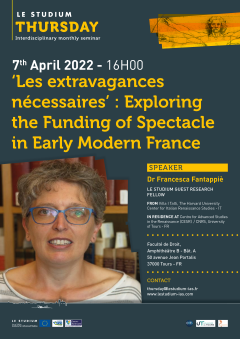‘Les extravagances nécessaires’ : Exploring the Funding of Spectacle in Early Modern France
Faculté de Droit, Amphithéâtre B - Bât. A
50 avenue Jean Portalis
37000 Tours
France
Presentation
How were court and civic festivities funded in the early modern period? The EU funded SPECTACLECONOMICS project (H2020-MSCA-IF-2020 - Marie Skłodowska-Curie Individual Fellowships 2021-2023) is an interdisciplinary research which aims to shed light on an often-disregarded aspect of the history of theatre and music: the economic realities of the production of public and private ceremonial and entertainment in early modern France. Scholars have tended to examine multiple aspects of such festivities (their allegorical meanings, political function, the artists involved, the birth of new theatrical and musical genres, etc.), but there is still no specific, systematic study that has dealt with quantifying the expenditure on such ephemeral cultural activities that could themselves be the subject of both blame (as a wasteful use of time and money) and praise (propaganda in favor of the sovereign, the state, and civic communities). The conventional view of festivities as a case of lavish conspicuous consumption is often supported by one set of sources reporting on it, such as printed descriptions, diary entries, letters, and so forth. But the information contained within these documents is usually determined by their function (official propaganda) or its sources (hearsay and gossip). Financial accounts of these festivities themselves, however, often present a different picture wherein expenses are carefully controlled and subject to prudent budget management. The gap between these “real” expenses and “fictional” expenditures is akin to the gap between reality and theatrical illusion; it also forces consideration of the professional world of artists and artisans—and the opportunities available to them—who created these festivities under taut economic and other constraints.
The talk will outline the state of the research by providing in the first place a definition of the field of study, which is the History of Theater and the Performing Arts. After a brief presentation of the academic discipline and its methodology, some preliminary scientific conclusions will be illustrated, alongside with the results already carried out on the Economics of Festivals, Music and Spectacle in Early Modern Florence. Among the aims of the project there is the comparative study of different social, political and economic contexts, to take a further step towards a comprehensive study of the economics of Spectacle at a transnational and European level. The main difficulty of this research is the lack of primary sources, such as financial accounts, which (vice versa) are easier to find for the second half of the 17th century. The presentation will conclude by illustrating the relevance of a critical interpretation of the different characteristics and functions of the documents used in Performing Arts studies.
Speaker
LE STUDIUM Guest Research Fellow
FROM: Villa I Tatti, The Harvard University Center for Italian Renaissance Studies - IT
IN RESIDENCE AT: Centre for Advanced Studies in the Renaissance (CESR) / CNRS, University of Tours - FR







